弗吉尼亚.伍尔夫《职业女性》文体
探弗吉尼亚伍尔夫文学创作理论“双性同体”

探弗吉尼亚伍尔夫文学创作理论“双性同体”20世纪英国文学中,探寻人性内在的复杂性、思想表现的多向性以及实现文学创新的理论构架在众多文学理论中显得尤为引人注目。
在这个时代,伍尔夫的文学创作理论“双性同体”是极具启发性的一个理论。
伍尔夫以其独特的视角和深刻的思考,提出了这一理论,并通过自己的文学作品实践这一理论,从而对20世纪的文学产生了深远的影响。
一、伍尔夫及其文学创作理论“双性同体”伍尔夫(Virginia Woolf,1882-1941),是20世纪英国文学中最重要的小说家和批评家之一,她对文学理论有着深刻的洞察和创新的思考。
她提出的“双性同体”理论,是她对性别和文学创作关系的深入思考的产物。
伍尔夫在《尤丽西斯》中提出了“双性同体”的概念。
她认为作为作者,应当拥有男性和女性两种性别特质,才能写出真实、丰满和生动的人物形象,才能更好地表现现实世界的多样性和复杂性。
在她的文学作品中,我们可以看到她对性别角色和限制的批判,以及对性别界限模糊性的捕捉与探索。
“双性同体”理论要求作者能够跳出自身的性别,具有男性和女性双重视角,超越性别的刻板印象和界限,去审视和创造更加真实和有血有肉的人物形象。
伍尔夫相信,只有这样的作者才能写出具有超越性别标签的、真正具有个体意识的人物,通过这些人物对世界进行深入的洞察和揭示。
二、“双性同体”在伍尔夫文学作品中的实践伍尔夫的文学作品深刻地体现了她提出的“双性同体”理论。
在《至灯塔》中,她运用了内心意识流的手法,展现了人物内心的复杂性和多样性。
她通过女性作家拉姆塞和纳吉尔的表现,展现了不同性别对生活与创作的理解和感悟,以及性别对人物身份的影响。
拉姆塞和纳吉尔这两个角色内心世界的复杂性和多样性,为读者呈现了一个非常真实和完整的形象。
在《至灯塔》中,伍尔夫刻画了一系列既脆弱又坚强、既敏感又坚毅、既温柔又果敢的女性形象,这些形象均具有男性和女性的性别特质,表现出“双性同体”理论要求的的双重性别视角。
弗吉尼亚·伍尔芙

弗吉尼亚·伍尔芙生平简介弗吉尼亚·伍尔芙,英国女作家,批判家,意识流小说的代表人物之一。
《墙上的斑点》是她第一篇典型的意识流作品。
(被认为是二十世纪现代主义与女性主义的先锋之一。
她在1905年开始职业写作生涯,刚开始是为《泰晤士报文学增刊》撰稿。
在某种程度上说,弗吉尼亚是上帝的弃儿,母亲、父亲相继病逝,是她难以承受的打击。
她的小说《达洛威夫人》中即充满了对病态幻觉的真实生动的描绘,可以说是她的精神写照。
弗吉尼亚不幸的生活经历,使她如含羞草一般敏感,又如玻璃般的易碎,她是优雅的,又是神经质的,一生都在优雅和疯癫之间游走。
不过,她每完成一部作品常会出现病兆,性格多变的她经常在脸上折射出内心的痛苦。
唯一值得庆幸的只是她的每一场发病,都有丈夫伦纳德在身边无微不至的照料,这无疑带给弗吉尼亚极大的鼓励和感动,“要不是为了他的缘故,我早开枪自杀了。
”当疯癫和幻听等精神分裂的症状重复来袭,最终不堪忍受时,她还是想到了自杀,在给伦纳德的遗言中她这样写到:“我不能再毁掉你的生活了。
我想,两个人不可能比我们一向更开心了。
”写作于一九四一年的《幕间》,是弗吉尼亚·伍尔芙辞世之前的最后一部作品。
当这部小说进展到约前五分之一的部分时,作家在让波因茨宅一个干粗活的女仆到清凉的睡莲池旁喘息片刻时顺便交待,十年前曾经有一位贵妇人在该处投水溺亡。
那是一片浓绿的水,其间有无数鱼儿“遨游在以自我为中心的世界里,闪着亮光。
”这真是一个不详之兆:仅在小说完成又过了一个月之后,也就是1941年3月28日,举世无双的伍尔芙在自己的口袋里装满了石头,投入了位于罗德麦尔(Rodmell)她家附近的欧塞河(River Ouse),以悲剧形式结束自己的生命。
尽管她有敏感的外表,她却写出了清晰富于洞察力的文章。
她的主要著作有:风格独特的长篇“意识流小说”《达洛威夫人》、《到灯塔去》和《海浪》等。
生平经历伍尔夫1882.1.25 伍尔芙出生于英国伦敦,肯辛顿,海德公园门(Hyde Park Gate)22号,原名弗吉尼亚·斯蒂芬(Adeline Virginia Stephen)。
Virginia Woolf奏响了女性战斗的号角——读《女性的职业》
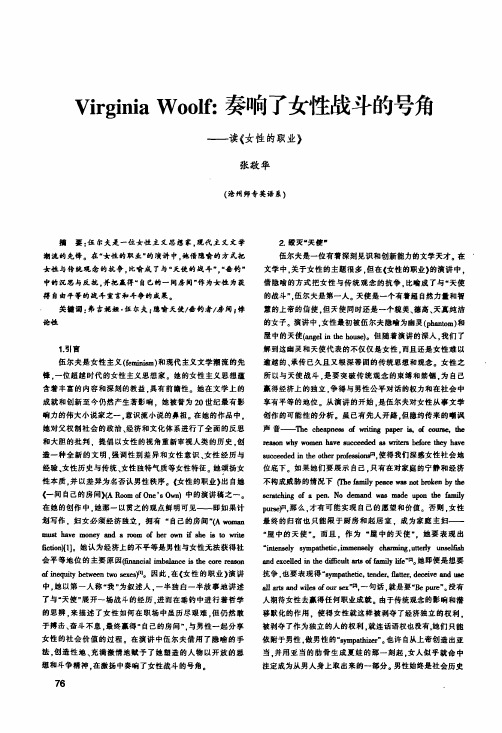
V i r gi ni aW ool f:奏响了女性战斗的号角——读《女性的职业》张敬华(沧州师专英语系)摘要:伍尔夫是一住女性主义思想家,现代主义文学潮流的先锋。
在“女性的职业”的演讲中,她借隐喻的方式把女性与传统现念的抗争。
比喻成了与。
天使的战斗”。
垂钓”中的沉思与反抗.并把赢得“自己的一问房间”作为女性为获得自由平等的战斗宣言和斗争的成果。
关键词:弗吉妮娅伍尔夫;隐喻天使/垂钓者/房间;悖论性1.引盲伍尔夫是女性主义(fem i ni sm)和现代主义文学潮流的先锋。
一位超越时代的女性主义思想家。
她的女性主义思想蕴含着丰富的内容和深刻的教益.具有前瞻性。
她在文学上的成就和刨新至今仍然产生著影响.她被誉为20世纪最有影响力的伟大小说家之一,意识流小说的鼻祖。
在她的作品中。
她对父权制社会的政治、经济和文化体系进行了全面的反思和大胆的批判。
提倡以女性的视角重新审视人类的历史,创造一种全新的文明,强调性别差异和女性意识、女性经历与经验、女性历史与传统、女性独特气质等女性特征。
她颂扬女性本质,并以差异为名否认男性秩序。
<女性的职业’出自她<一间自己的房间>(A R o omof O ne’8O w n)中的演讲稿之一。
在她的创作中.她那一以贯之的观点鲜明可见——即如果计划写作。
妇女必须经济独立,拥有“自己的房问。
(A w o m an m ust ha ve m one y a nd a r oom of her ow n i f s he i s t O w r i t e f i ct i on)[1]。
她认为经济上的不平等是男性与女性无法获得社会平等地位的主要原因(f m anci al i m bal ance i s t he co r e r eas on of i neq ui t y bet w e en t w o se xes)f l!。
因此,在‘女性的职业》演讲中,她以第一人称“我”为叙述人。
弗吉尼亚·伍尔夫的女性主义文学批评

弗吉尼亚·伍尔夫的女性主义文学批评作者:倪坤鹏来源:《现代语文(学术综合)》2013年第10期摘要:弗吉尼亚·伍尔夫将女性的现状与社会环境及经济政治地位相联系,探寻妇女受压迫和束缚的根源,并以女性独特的情感和独立的价值观为基础,从女性自身出发,探讨女性写作问题,并在自己的创作中不断地寻求着和实现着男女两性的融合与和谐。
她的女性主义文论唤醒了许多女作家强烈的性别意识和创作热情,为当代女性主义文学批评理论和女性主义文学创作的发展奠定了坚实的基础。
关键词:女性写作女性主义双性同体女性意识英国现代女作家弗吉尼亚·伍尔夫不仅是一位杰出的意识流小说家,还是一位女性主义先驱。
她出生在高级知识分子家庭,自小深受英国传统文化和文学的熏陶及影响,了解英国传统的家庭模式;然而她本人却因为时代和家庭的局限,未能接受正规的教育,只能在家学习。
她的创作以现代主义先锋意识和反传统观念而闻名,她的文学观念与其女性立场是息息相关的。
玛丽·伊格尔顿认为“从很大程度上,女性主义批评很难超越伍尔夫,她的思想预示着女性主义批评的多元化。
无论是从马克思主义的角度,从心理分析的角度,还是从后结构主义的角度进行的女性批评均以她的思想为出发点。
”[1](P1)一、引语弗吉尼亚·伍尔夫是女性主义理论的先驱之一,她极大程度上摆脱了传统的菲乐斯中心主义的学说,倡导全新的女性写作理念,为女性主义理论的丰富和发展做出了卓越的贡献。
“伍尔夫的现代主义思想与女性主义思想体现了她对现实主义文学传统与父权制社会传统的独特反思与深刻背离。
两者互为补充,不可分割地构成其思想主流而贯穿整个创作生涯。
”[2]伍尔夫将女性的现状与社会环境及经济政治地位相联系,探寻妇女受压迫和束缚的根源,并以女性独特的情感和独立的价值观为基础,探讨女性写作问题。
与此同时,在自己的创作中她不断地寻求着和实现着男女两性的融合与和谐。
本研究主要聚焦于伍尔夫的女性主义理论,她的观点主要体现于专门讨论女性问题的演讲和论文里,如最为著名的《一间自己的房间》,讨论妇女写作的《妇女与小说》及《妇女的职业》,还有创作后期观点更为成熟、女性主义立场态度更为坚定的《三个基尼》。
弗吉尼亚.伍尔芙的女性主义思想浅析

弗吉尼亚.伍尔芙的女性主义思想浅析一、引言弗吉尼亚·伍尔芙是近现代文学史上一位伟大的文学家,不仅是意识流小说的开创者之一,更是一位重要的女性主义小说家。
作为20世纪女性主义的先驱,她的女性意识贯穿于几乎每一部主要作品之中。
美国的玛丽·伊格尔顿认为:“从很大程度上讲,女性主义批评很难超越伍尔夫,她的思想预示着女性主义批评的多元化。
无论从马克思主义的角度,从心理分析的角度,还是从后结构主义的角度进行的当代女性主义批评均以她的思想为出发点。
”[1]本文力图从其女性主义思想来源和女性主义思想的体现两个方面来分析弗吉尼亚·伍尔芙的女性主义思想。
二、女性主义思想来源首先,弗吉尼亚的父亲莱斯利·斯蒂芬是英国维多利亚时代一位著名的评论家、学者和传记家。
父亲的渊博知识对年幼的弗吉尼亚产生了一定的影响。
而弗吉尼亚也是自幼在父亲的书房里博览群书,为日后文学创作奠定了一定的基础。
同时,维多利亚时期父权制思想根深蒂固,重男轻女。
虽然弗吉尼亚天生聪慧,但父亲仍然只是将她的哥哥送到学校,而把她留在家中。
这种不公平的待遇使她产生了对父权社会的不满和怨恨。
其次,由于家庭背景的特殊性,幼年时期,弗吉尼亚和姐姐都曾遭受同母异父的哥哥乔治和杰瑞德的性侵犯。
关于这一点,伍尔芙在信函、日志和论文集中都有写到,她说:“一想起我的同母异父哥哥,我就羞耻得禁不住颤抖起来。
在我六岁的时候,他站在我身边,用手摸我的身体的下部。
”[2] 维多利亚时期的父权制社会中,男性占主导地位,他们是家庭的支柱,可以任意支配家里的一切,包括家中的女性。
这段经历对于伍尔芙来说是屈辱,在后来她的作品《存在的瞬间》中。
她痛苦地回忆道:“我觉得自己就像一条不幸的小鱼与一只巨大而骚动的鲨鱼关在同一个水槽里。
”这样的经历更加使她产生对父权社会的厌恶,并使她成年后无法接受任何男性的性爱。
而和姐姐凡妮莎这种亲密的关系使她感觉到舒适,激发了她同性恋的倾向。
professions for women的主题思想
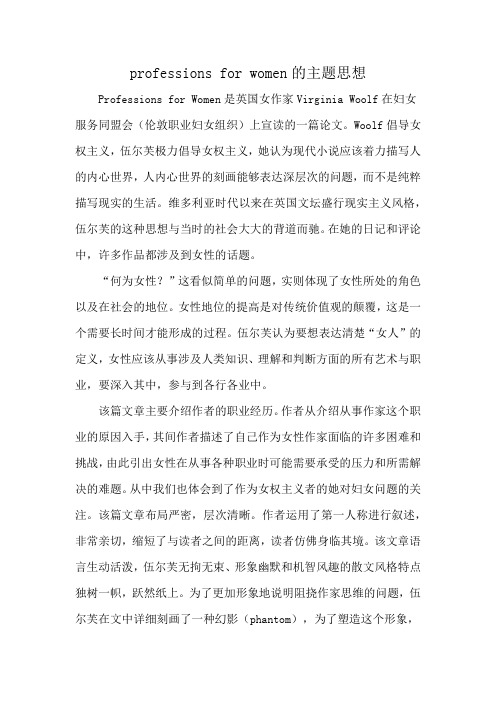
professions for women的主题思想Professions for Women是英国女作家Virginia Woolf在妇女服务同盟会(伦敦职业妇女组织)上宣读的一篇论文。
Woolf倡导女权主义,伍尔芙极力倡导女权主义,她认为现代小说应该着力描写人的内心世界,人内心世界的刻画能够表达深层次的问题,而不是纯粹描写现实的生活。
维多利亚时代以来在英国文坛盛行现实主义风格,伍尔芙的这种思想与当时的社会大大的背道而驰。
在她的日记和评论中,许多作品都涉及到女性的话题。
“何为女性?”这看似简单的问题,实则体现了女性所处的角色以及在社会的地位。
女性地位的提高是对传统价值观的颠覆,这是一个需要长时间才能形成的过程。
伍尔芙认为要想表达清楚“女人”的定义,女性应该从事涉及人类知识、理解和判断方面的所有艺术与职业,要深入其中,参与到各行各业中。
该篇文章主要介绍作者的职业经历。
作者从介绍从事作家这个职业的原因入手,其间作者描述了自己作为女性作家面临的许多困难和挑战,由此引出女性在从事各种职业时可能需要承受的压力和所需解决的难题。
从中我们也体会到了作为女权主义者的她对妇女问题的关注。
该篇文章布局严密,层次清晰。
作者运用了第一人称进行叙述,非常亲切,缩短了与读者之间的距离,读者仿佛身临其境。
该文章语言生动活泼,伍尔芙无拘无束、形象幽默和机智风趣的散文风格特点独树一帜,跃然纸上。
为了更加形象地说明阻挠作家思维的问题,伍尔芙在文中详细刻画了一种幻影(phantom),为了塑造这个形象,作者运用了多种修辞手法,如拟人、暗喻和对比法,语言质朴,栩栩如生。
文章大篇幅介绍了作者与幻影之间的激烈战争。
伍尔芙认为自己写评论作品时需要与一种幻影搏斗,这个幻影就是女人。
实际上,这个幻影女人就是存在于人脑子中的世俗意识,这种意识禁钿了女性进行创造性的思维,她们被男作家创作的极端俗套阻碍了,在这方面男人们虽然明达地给予女人极大的自由,却极其严厉地贵难女人身上的这种自由。
女性的职业(草稿)
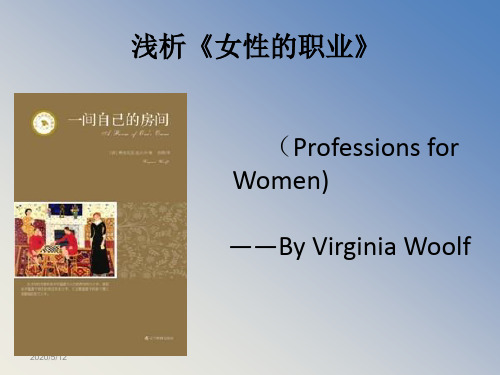
• 究其根源就是,在男权社会中,经济地位 和社会地位的低下是女性被迫害、被排挤 到社会边缘、乃至于殉难的根源。但是, 这一切并没有让勇敢睿智的伍尔夫畏缩, 她通过讲述自身写作的成功经历,拉开了 女性战斗的序幕。她把“杀死屋中天使” (killing the angel in the house) 的战斗演绎 成一场激扬女性斗志,摒弃女性传统角色 的生死战斗。这场战斗成果由最初的一只 “美丽的波斯猫”(a beautiful Persian cat),到一辆“小汽车”(a motor car),再 到“一间自己的房间”(a room of one’s own), 揭示了女性不屈服
end……
2012-1-1
《女性的职业》出自《一间自己的房间》(A Room of One’s Own) 中的演讲稿之一她认 为经济上的不平等是男性与女性无法获得 社会平等地位的主要原因(financial imbalance is the core reason of inequity between two sexes)。因此,在《女性的职 业》演讲中,她以第一人称“我”为叙述 人,一半独白一半故事地讲述了与“天使” 展开一场战斗的经历,进而在垂钓中进行 着哲学的思辨,来描述了女性如何在职场 中虽历尽艰难,但仍然敢于搏击、奋斗不 息,最终赢得“自己的房间”,与男性一 起分享女性的社会价值的过程。在演讲中 伍尔夫借用了隐喻的手法,创造性地、充 满激情地赋予了她塑造的人物以开放的思 想和斗争精神,在激扬中奏响了女性战斗 的号角。
• 从演讲的开始,是伍尔夫对女性从事文学创作的 可能性的分析。虽已有先人开路,但隐约传来的 嘲讽声音———The cheapness of writing paper is, of course, the reason why women have succeeded as writers before they have succeeded in the other professions,使得我们深感女性社会地位底下. • 如果她们要展示自己,只有在对家庭的宁静和经 济不构成威胁的情况下(The family peace was not broken by the scratching of a pen. No demand was made upon the family purse),那么,才有可能实现 自己的愿望和价值. • 只能限于厨房和起居室, 成为家庭主妇——— “屋中的天使”
现代大学英语精读5翻译及课后习题答案(5个单元)
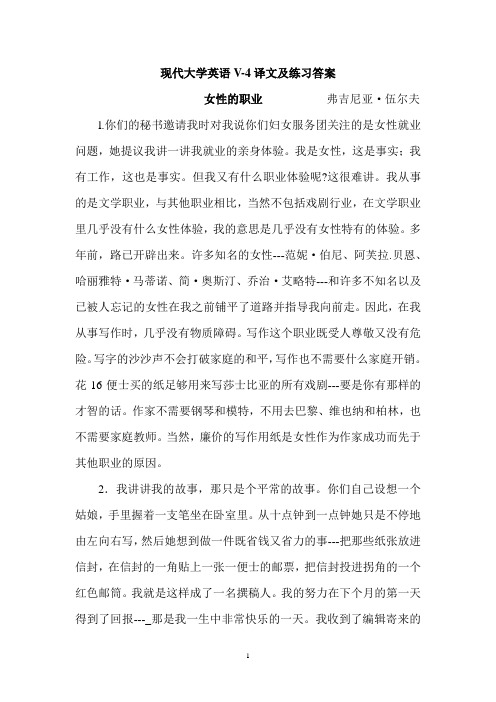
现代大学英语V-4译文及练习答案女性的职业弗吉尼亚·伍尔夫l.你们的秘书邀请我时对我说你们妇女服务团关注的是女性就业问题,她提议我讲一讲我就业的亲身体验。
我是女性,这是事实;我有工作,这也是事实。
但我又有什么职业体验呢?这很难讲。
我从事的是文学职业,与其他职业相比,当然不包括戏剧行业,在文学职业里几乎没有什么女性体验,我的意思是几乎没有女性特有的体验。
多年前,路已开辟出来。
许多知名的女性---范妮·伯尼、阿芙拉.贝恩、哈丽雅特·马蒂诺、简·奥斯汀、乔治·艾略特---和许多不知名以及已被人忘记的女性在我之前铺平了道路并指导我向前走。
因此,在我从事写作时,几乎没有物质障碍。
写作这个职业既受人尊敬又没有危险。
写字的沙沙声不会打破家庭的和平,写作也不需要什么家庭开销。
花16便士买的纸足够用来写莎士比亚的所有戏剧---要是你有那样的才智的话。
作家不需要钢琴和模特,不用去巴黎、维也纳和柏林,也不需要家庭教师。
当然,廉价的写作用纸是女性作为作家成功而先于其他职业的原因。
2.我讲讲我的故事,那只是个平常的故事。
你们自己设想一个姑娘,手里握着一支笔坐在卧室里。
从十点钟到一点钟她只是不停地由左向右写,然后她想到做一件既省钱又省力的事---把那些纸张放进信封,在信封的一角贴上一张一便士的邮票,把信封投进拐角的一个红色邮筒。
我就是这样成了一名撰稿人。
我的努力在下个月的第一天得到了回报---_那是我一生中非常快乐的一天。
我收到了编辑寄来的一封信,里面装有一张一英镑十先令六便士的支票。
为了让你们了解我不值得被称作职业女性,对人生的艰难和奋斗知之甚少,我得承认我没用那笔钱买食物、付房租、买袜子和肉,而是出去买了一只猫,一只漂亮的波斯猫,这只猫不久就引起了我和邻居间的激烈争端。
3.什么会比写文章并用赚得的钱买波斯猫来得更容易?但再想一想,文章得有内容。
我好像记得我的文章是评论一部名人写的小说。
探弗吉尼亚伍尔夫文学创作理论“双性同体”

探弗吉尼亚伍尔夫文学创作理论“双性同体”1. 引言1.1 探弗吉尼亚伍尔夫文学创作理论“双性同体”弗吉尼亚·伍尔夫(Virginia Woolf)被认为是20世纪英国文学史上最伟大的小说家之一,她的文学作品被广泛地研究和解读。
她的文学创作理论“双性同体”(androgyny)更是备受关注。
在伍尔夫看来,性别并非二分的,而是一个具有双重性质的现象,每个人内在同时容纳着男性和女性的特质。
“双性同体”理论是伍尔夫对性别身份的探讨和重新定义,她认为只有当个体内在的男性和女性特质得到平衡和统一时,创作才能得以真正地实现。
这种“双性同体”不仅体现在文学作品中,也延伸到生活中的各个方面,影响着个体的思想和行为。
伍尔夫通过自己的文学作品具体展现了“双性同体”的概念,她的小说中的人物常常具有模糊的性别特征,同时反映出男性和女性在不同情境下的表现。
这种性别的流动性和多样性使得伍尔夫的作品更加富有深度和多元性,引起了广泛的关注和讨论。
在当时的文学界,伍尔夫的“双性同体”理论颇具争议,但也获得了一定的认可和赞扬。
她的文学作品为后世的作家和评论家提供了新的思路和视角,影响深远。
通过对伍尔夫的“双性同体”理论进行深入探讨,可以更好地理解她作品的内涵和思想,同时也能够对当代文学理论产生一定的启发和影响。
2. 正文2.1 探弗吉尼亚伍尔夫文学创作理论“双性同体”与性别身份的探讨在现代文学批评中,探讨性别身份和性别角色在作家文学创作中的表现和影响一直是一个备受关注的话题。
而探弗吉尼亚伍尔夫提出的“双性同体”理论为我们提供了全新的视角来审视这一问题。
“双性同体”是指一个人具有同时拥有男性和女性特质的身体或灵魂状态。
在伍尔夫看来,人的性别身份不应该被简单地划分为男性或女性,而应该是一个更为复杂和多样化的存在。
她认为每个人的内心都蕴含着男性和女性两种性别属性,而这种双重性别属性的存在会对个体的思想和行为产生深远的影响。
通过她的文学作品和文学批评,伍尔夫试图打破传统性别观念的束缚,呼吁人们能够接纳和包容自己及他人的多重性别身份。
《华伦夫人的职业》中的女性人物分析
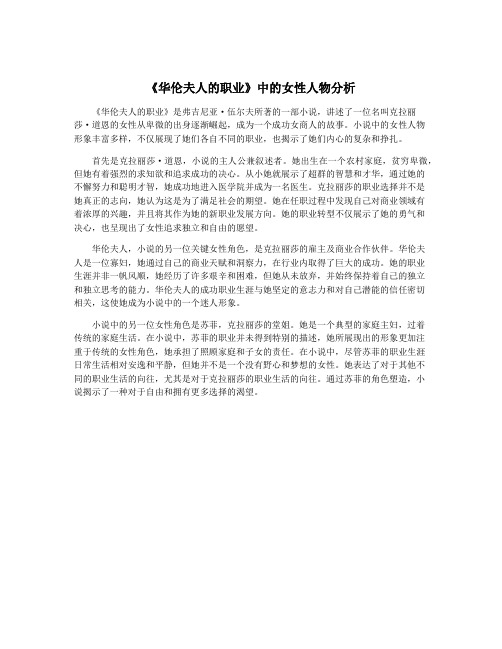
《华伦夫人的职业》中的女性人物分析《华伦夫人的职业》是弗吉尼亚·伍尔夫所著的一部小说,讲述了一位名叫克拉丽莎·道恩的女性从卑微的出身逐渐崛起,成为一个成功女商人的故事。
小说中的女性人物形象丰富多样,不仅展现了她们各自不同的职业,也揭示了她们内心的复杂和挣扎。
首先是克拉丽莎·道恩,小说的主人公兼叙述者。
她出生在一个农村家庭,贫穷卑微,但她有着强烈的求知欲和追求成功的决心。
从小她就展示了超群的智慧和才华,通过她的不懈努力和聪明才智,她成功地进入医学院并成为一名医生。
克拉丽莎的职业选择并不是她真正的志向,她认为这是为了满足社会的期望。
她在任职过程中发现自己对商业领域有着浓厚的兴趣,并且将其作为她的新职业发展方向。
她的职业转型不仅展示了她的勇气和决心,也呈现出了女性追求独立和自由的愿望。
华伦夫人,小说的另一位关键女性角色,是克拉丽莎的雇主及商业合作伙伴。
华伦夫人是一位寡妇,她通过自己的商业天赋和洞察力,在行业内取得了巨大的成功。
她的职业生涯并非一帆风顺,她经历了许多艰辛和困难,但她从未放弃,并始终保持着自己的独立和独立思考的能力。
华伦夫人的成功职业生涯与她坚定的意志力和对自己潜能的信任密切相关,这使她成为小说中的一个迷人形象。
小说中的另一位女性角色是苏菲,克拉丽莎的堂姐。
她是一个典型的家庭主妇,过着传统的家庭生活。
在小说中,苏菲的职业并未得到特别的描述,她所展现出的形象更加注重于传统的女性角色,她承担了照顾家庭和子女的责任。
在小说中,尽管苏菲的职业生涯日常生活相对安逸和平静,但她并不是一个没有野心和梦想的女性。
她表达了对于其他不同的职业生活的向往,尤其是对于克拉丽莎的职业生活的向往。
通过苏菲的角色塑造,小说揭示了一种对于自由和拥有更多选择的渴望。
弗吉尼亚-伍尔夫《达洛卫夫人》主要内容简介及赏析

弗吉尼亚-伍尔夫《达洛卫夫人》主要内容简介及赏析(最新版)编制人:__________________审核人:__________________审批人:__________________编制单位:__________________编制时间:____年____月____日序言下载提示:该文档是本店铺精心编制而成的,希望大家下载后,能够帮助大家解决实际问题。
文档下载后可定制修改,请根据实际需要进行调整和使用,谢谢!并且,本店铺为大家提供各种类型的经典范文,如诗歌散文、原文赏析、读书笔记、经典名著、古典文学、网络文学、经典语录、童话故事、心得体会、其他范文等等,想了解不同范文格式和写法,敬请关注!Download tips: This document is carefully compiled by this editor.I hope that after you download it, it can help you solve practical problems. The document can be customized and modified after downloading, please adjust and use it according to actual needs, thank you!In addition, this shop provides you with various types of classic sample essays, such as poetry and prose, original text appreciation, reading notes, classic works, classical literature, online literature, classic quotations, fairy tales, experience, other sample essays, etc. if you want to know the difference Please pay attention to the format andwriting of the sample essay!弗吉尼亚-伍尔夫《达洛卫夫人》主要内容简介及赏析【导语】:【作品提要】克拉丽莎达洛卫是一位中年贵妇,她的丈夫是国会议员。
弗吉尼亚伍尔夫
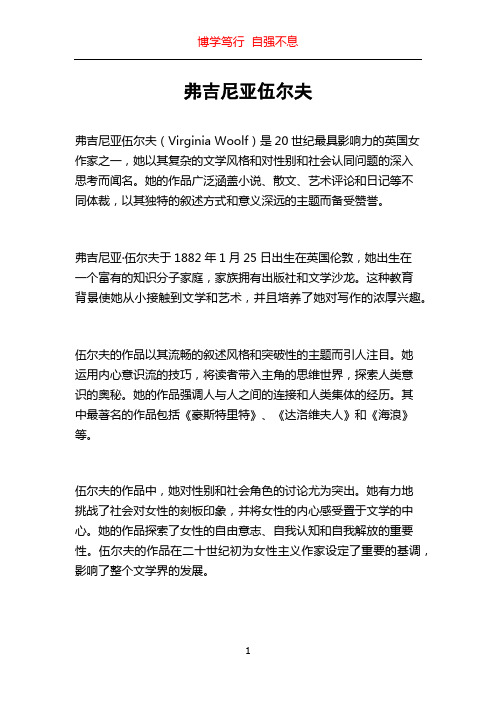
弗吉尼亚伍尔夫弗吉尼亚伍尔夫(Virginia Woolf)是20世纪最具影响力的英国女作家之一,她以其复杂的文学风格和对性别和社会认同问题的深入思考而闻名。
她的作品广泛涵盖小说、散文、艺术评论和日记等不同体裁,以其独特的叙述方式和意义深远的主题而备受赞誉。
弗吉尼亚·伍尔夫于1882年1月25日出生在英国伦敦,她出生在一个富有的知识分子家庭,家族拥有出版社和文学沙龙。
这种教育背景使她从小接触到文学和艺术,并且培养了她对写作的浓厚兴趣。
伍尔夫的作品以其流畅的叙述风格和突破性的主题而引人注目。
她运用内心意识流的技巧,将读者带入主角的思维世界,探索人类意识的奥秘。
她的作品强调人与人之间的连接和人类集体的经历。
其中最著名的作品包括《豪斯特里特》、《达洛维夫人》和《海浪》等。
伍尔夫的作品中,她对性别和社会角色的讨论尤为突出。
她有力地挑战了社会对女性的刻板印象,并将女性的内心感受置于文学的中心。
她的作品探索了女性的自由意志、自我认知和自我解放的重要性。
伍尔夫的作品在二十世纪初为女性主义作家设定了重要的基调,影响了整个文学界的发展。
此外,伍尔夫还以其对艺术的独特见解而著名。
她对写作和艺术的评论以及对当代文学、绘画和音乐的批评,展现出她对艺术的深入理解和独到的观点。
她的散文集《写作的意义》和《现代小说》被广泛认为是文学评论的经典之作。
在她的一生中,伍尔夫面临了许多心理健康问题和心理困扰。
她曾长期患有抑郁症,并在1941年投河自尽。
尽管她的一生经历了许多矛盾和痛苦,但她的作品却成为了文学史上的经典之一,深深地影响了后世的作家和读者。
值得一提的是,伍尔夫在她的作品中表现出了对性别的关注和对女性解放的呼吁。
她的作品为后来的女性主义文学作家铺平了道路,开启了女性文学的新篇章。
伍尔夫的作品不仅帮助女性找到了自己的声音,同时也挑战了当时所流行的权威文学观念。
总之,弗吉尼亚伍尔夫是一位开创性的作家,她的作品深刻地影响了文学界,并对性别和社会认同问题的思考做出了重要贡献。
女性写作职业的探讨

女性写作职业的探讨【摘要】本文阐释了英国女作家弗吉尼亚伍尔夫关于女性写作的论述,她所出版的文集同样折射出她光辉的女权主义思想。
伍尔夫在作品中尤其对于女性写作的权力和所遭受的性别歧视的阻碍做了充分的剖析:女性进行文学创作的阻碍在于社会条件的缺失,而造成这种必要条件缺少的根本原因在于男性视角下的社会心理给女性带来的压力。
妇女必须依靠自己的力量摆脱束缚,解放自己的灵魂,真正发挥所长。
【关键词】女性主义;女性写作;弗吉尼亚伍尔夫英国女作家弗吉尼亚伍尔夫,被誉为二十世纪现代主义与女性主义的先锋。
两次世界大战期间,她是伦敦文学界的核心人物,同时也是布卢姆茨伯里派(bloomsbury group)的成员之一。
通过她的小说故事她表达出一种愤怒:《远航》,《日以继夜》,《灯塔行》,《三个基尼金币》,以及《达罗卫夫人》,其中的各种人物表达了其作者内心深处的呼吁。
正如《英国女性文学家大辞典》中所述,“她从小沉浸在文学中”,现在被广泛称为“女性文学中一个重要人物”(托德,第733页)。
作为一个女权主义者和一个女同性恋者,弗吉尼亚伍尔夫将自己所有的理论和激情投注于她的精彩作品中,深刻探讨了男性和女性的社会原则,引导人们的家庭生活,职业生活和心理问题的冲突。
她总是主张,妇女应该被看作与是男子平起平坐,而不仅仅是他们的支持。
在伍尔夫的大部分作品中,非常重视对妇女的工作,特别是与写作相关的职业。
她在《一个人自己的房间》作品集中,探讨了有关妇女与小说写作的问题。
这本书据《英国诺顿文学》描述,是,“最为文学史家赞同的,第一个英文语言的女性主义评论的主要成就”(艾布拉姆斯第1343页)。
这本书以一个问题开篇,“但是,你可能会说,我们请你谈谈妇女和小说,这与一个自己的房间有何关联?”(《一个人自己的房间》第2页)这个问题的第一个词是“但是”,这表明读者即将看到的很可能是标新立异,与预期相反的理论,这也意味着人们不能从普遍的角度来看待妇女与小说写作的关系。
professions for woman 伍尔夫中文

Professions for Woman 伍尔夫中文“一个女人要想成功,必然要成为男人的同行者,不是他的对手。
”--伍尔夫伍尔夫自幼接受教育,她的父亲是一个思想大胆的人,他喜欢欣赏女性的才华。
由于这种背景,伍尔夫成为了一个渴望独立、自由和平等的女性。
她经历了职场的挫折,但也经历了成功。
在她的时代,女性职业选择非常有限,但是她却有着非常独特的职业选择。
伍尔夫是一个著名的女性作家,在当时的社会中,女性成功的机会很少。
尤其是在写作这个领域,女性很难获得成功。
伍尔夫却凭借自己的才华,成功地跨越了种种障碍。
她的成功在当时的英国社会引起了轰动,成为一个鼓舞人心的榜样,也是一个榜样,鼓励女性去追求自己的梦想。
如果说伍尔夫在她的时代可以创造出如此的成就,那么在如今这个时代,女性更应该被尊重和肯定。
在当今社会中,对女性的职业选择仍然存在着很多限制和偏见。
然而,女性应该有权利选择她们想要从事的职业,就像男性一样。
让我们来看看一些专业,这些专业或许是女性的理想选择。
第一,医生。
医生是一个崇高的职业,医生有着极高的社会地位和收入。
由于医生的责任和压力,这个职业需要高度的自律性和责任感。
同时,医生也需要拥有一定的学术科学和医学知识。
第二,律师。
作为一个律师,你需要熟练掌握法律法规,并拥有丰富的经验。
女性律师在当今社会中越来越普遍,越来越受到尊重。
她们通过努力工作和自我提升,已经成为了一些有所成就的律师。
第三,金融分析师。
金融分析师可以协助公司或政府机构调查和评估投资机会、市场趋势和市场预期。
这个职业需要一定的数学和科学背景,同时也需要一定的研究技能。
第四,计算机科学家。
计算机科学家可以设计、开发和测试各种软件系统,并编写代码,以确保他们的软件工作得很好。
计算机科学家需要有较高的技术水平和一定的专业知识,如编程、数据挖掘技术等。
第五,企业家。
作为企业家,你需要有一定的市场洞察力,以及热爱创新和创造价值的激情和毅力。
尤其是在为女性提供服务的商业领域,女性企业家的角色变得越来越重要。
弗吉尼·伍尔夫的“雌雄同体”观与文学创作

弗吉尼·伍尔夫的“雌雄同体”观与文学创作[摘要]“雌雄同体”概念是英国着名女作家弗吉尼亚·伍尔夫提出的文学观点,它既是伍尔夫女性主义思想中的重点概念,也是西方女性主义的重要内容。
文章探讨了学术界关于“雌雄同体”概念的研究与争议、“雌雄同体”观在伍尔夫整个创作过程中的运用、她常用的“雌雄同体”文学意象以及该观点对西方女性主义的影响等。
[关键词]弗吉尼亚·伍尔夫;“雌雄同体”;小说创作;文学意象英国着名女作家弗吉尼亚·伍尔夫(Virginia Woolf,1882—1941)的女性主义名篇《一间自己的房间》(A Room of One‘s Own,1929)借用诗人柯勒律治(Samuel Taylor Coleridge,1772—1834)的名言指出:“如果一个人是男性,他头脑中那部分女性因素必定仍然在发挥作用;如果是个女性,她也必须和头脑中的男性因素沟通对话。
柯勒律治曾说,伟大的心灵总是雌雄同体(androgyny)的,他大概就是这个意思。
……也许与单性的脑子相比,雌雄同体的双性心灵更不倾向于显示这些特征。
”该着作中,这一观点的具体体现是一对青年男女坐进出租车的意象。
伍尔夫希望,两性之间能够合作,并且认为其合作程度就是社会文明的程度。
只要个人学会培养大脑的阳刚(maculinity)与阴柔(feminili-ty)的两个方面,他/她就会越来越接近整体性(wholeness)。
随着女性主义的发展以及人们对伍尔夫女性主义思想认识的加深,她的这一观点遂成为国际学术界的长久论题。
本文拟从以下几个方面对伍尔夫的“雌雄同体”观进行探讨:学术界关于“雌雄同体”的研究与争议、“雌雄同体”观在伍尔夫整个创作过程中的运用、她常用的文学意象以及该观点对西方女性主义的影响等。
一关于“雌雄同体”许多中外作家和女性主义者都曾探讨过伍尔夫“雌雄同体”概念,而且,他们的表述也不尽相同。
概括地说,以英美法为主的西方学者,大多以女性主义立场,从宏观的角度出发,主要在肯定伍尔夫“雌雄同体”观(也有少数学者持否定态度)的基础上,或对英语文学史中的“雌雄同体”女作家进行宏观考察,如卡罗琳·赫尔布伦(Carolyn Heilbrun)的《走向雌雄同体》(Towards Androgyny:Aspects of Male and Female in Literature,1973),或从伍尔夫的性格和特殊经历出发研究她提出此观点的原因,如南希·贝茨(Nancy Bazin)的《弗吉尼亚·伍尔夫与雌雄同体幻想》(Virginia Woolf and the Androgynous Vi-sion,1973)、艾利斯·凡·克立(Alice van Kelly)的《弗吉尼亚·伍尔夫的小说:事实与幻想》(The Nov—els of Virginia Woolf:Fact and Vision,1973)以及简·诺瓦克(Jane Novak)的《平衡的刀刃》(The Ra—zor Edge of Balance:a Study of Virginia Woolf,1974)、林顿·戈登(Lyndall Gordon)的《弗吉尼亚·伍尔夫的作家生涯》(Virginia Woolf:a Writer‘sLife,1984)等,或结合其它理论来解读这一观点,如托利·莫伊(TorilMoi)的《性/文本政治》(Sexual/Textual Politics,1985)、马吉科·米诺一品可奈(Makiko Minow-Pinkney)的《弗吉尼亚·伍尔夫与主体问题》(Virginia Woolf and the Problem of the Subject,1987)等都借用了解构主义的观点对“雌雄同体”观进行了分析。
Vol 5, Unit 4 Microsoft Word 文档

Lesson Four Professions for Women一、课文导读(一) 内容梗概弗吉尼亚·伍尔夫的这篇演讲稿不同于她的其他主要作品,以相对轻松的方式探讨了女性职业这一话题。
她先讲述了自己作为一名新闻工作者、书评家和作家的亲身经历。
在描述影响她写作生涯中的性别意识时,弗吉尼亚·伍尔夫引用了一个生动的暗喻“家里的天使”。
为了彻底摆脱男性支持者这一传统女性角色,伍尔夫下定决心要“杀死这个天使”。
作者在第二部分引用了“一位坐在深湖边手握鱼竿沉浸在梦境中的钓鱼者”这一暗喻来表明要坚持自己的艺术创作方法,独立于男性评论家的影响。
在演讲结尾处作者引用了第三个暗喻“自己的房间”,借此指出虽然女性获得了自由并取得了经济上的独立,她们仍然需要继续作战,维持自己的地位,需要用新的思想、态度和价值观武装自己。
(1) 背景知识1. A Room of One’s OwnIt is considered to be the most persuasive of all feminist literary manifestos, which deals with the status of women, the difficulties of a woman artist, the future of fiction and woman’s part in it. In his article “Habits of Thought” John Burt outlines the main ideas of the book in this way:A Room of One’s Own is primarily about the effects of women’s poverty upon their art, but it is also about growing uneasiness between sexes…The central argument of the book might be summarized in five theses:1) Patriarchal society imposes economic and social restrictions upon women on account of its own need for psychological support.2) These restrictions limit the experience upon which art depends, causing creative women to suffer and depriving the general culture of their contributions.3) As the material conditions of women has improved, women writers have emerged, and the integrity of their work, its freedom from the scars and kinks of personal limitations, has risen in proportion to their status.4) The rise of women has deprived the patriarchy of its psychological support, causing uncomfortable relations between the sexes that reflect themselves in the limitations of contemporary art.5) When the emancipation of women is complete, a more adequate sexuality and a more adequate imagination, marked by androgyny or sexual openness, must emerge.2. The National League for Woman’s ServiceSt. Mutien’s Christian Brothers’ Residence, located on La Salle University’s South Campus, was once one of the busiest centers in Germantown. In 1917, this building was known as “Little Wakefield”and was a demonstration center for one of most active branches of the National League for Woman’s Service. It was at this building that the women of Germantown held home economics classes, raised vegetables and cultivated bees in an effort to do their part for the nation during World War I.Founded in January 1917 by a group of patriotic women with the sanction and cooperation of secretary of state James W. Wilson, the object of this organization was to standardize the work of the women of America along the lines of constructive patriotism; to develop the resources and to promote the efficiency of women in meeting their everyday responsibilities to home, to State, to nation and to humanity; to provide organized, trained groups in every community prepared to cooperate with the Red Cross and other agencies in dealing with any calamity, fire, flood, famine, economic disorder, etc., and in tie of war to supplement the work of the Red Cross, the army and navy, and to deal with the questions of women’s work and women’s welfare.二、词汇与短语(一) 词汇1. art /a:t/ n.1) (pl) trick; wile 骗术—well-practised in the arts of seduction惯用诱骗诡计2) skill in such creation艺术技巧—Her performance displayed great art. 她的表演表现了高度的艺术技巧。
女性的职业(上)

女性的职业(上)作者:弗吉尼娅·伍尔夫来源:《英语世界》2020年第09期When your secretary invited me to come here, she told me that your Society is concerned with the employment of women and she suggested that I might tell you something about my own professional experiences. It is true I am a woman; it is true I am employed; but what professional experiences have I had? It is difficult to say. My profession is literature; and in that profession there are fewer experiences for women than in any other, with the exception of the stage—fewer, I mean, that are peculiar1 to women. For the road was cut many years ago—by Fanny Burney2, by Aphra Behn3, by Harriet Martineau4, by Jane Austen, by George Eliot—many famous women, and many more unknown and forgotten, have been before me, making the path smooth, and regulating my steps. Thus, when I came to write, there were very few material obstacles in my way. Writing was a reputable and harmless occupation. The family peace was not broken by the scratching of a pen. No demand was made upon the family purse. For ten and sixpence one can buy paper enough to write all the plays of Shakespeare—if one has a mind that way. Pianos and models, Paris, Vienna, and Berlin, masters and mistresses, are not needed by a writer. The cheapness of writing paper is, of course, the reason why women have succeeded as writers before they have succeeded in the other professions.But to tell you my story—it is a simple one. You have only got to figure to yourselves a girl in a bedroom with a pen in her hand. She had only to move that pen from left to right—from ten o’clock to one. Then it occurred to her to do what is simple and cheap enough after all—to slip a few of those pages into an envelope, fix a penny stamp in the corner, and drop the envelope into the red box at the corner. It was thus that I became a journalist; and my effort was rewarded on the first day of the following month—a very glorious day it was for me—by a letter from an editor containing a cheque for one pound ten shillings and sixpence. But to show you how little I deserve to be called a professional woman, how little I know of the struggles and difficulties of such lives, I have to admit that instead of spending that sum upon bread and butter, rent, shoes and stockings, or butcher’s bill s, I went out and bought a cat—a beautiful cat, a Persian cat, which very soon involved me in bitter disputes with my neighbours.What could be easier than to write articles and to buy Persian cats with the profits? But wait a moment. Articles have to be about something. Mine, I seem to remember, was about a novel by a famous man. And while I was writing this review, I discovered that if I were going to review books I should need to do battle with a certain phantom. And the phantom was a woman, and when I came to know her better I called her after the heroine of a famous poem, The Angel in the House. It was she who used to come between me and my paper when I was writing reviews. It was she who bothered me and wasted my time and so tormented me that at last I killed her. You who come of a younger andhappier generation may not have heard of her—you may not know what I mean by the Angel in the House. I will describe her as shortly as I can. She was intensely sympathetic. She was immensely charming. She was utterly unselfish. She excelled in the difficult arts of family life. She sacrificed herself daily. If there was chicken, she took the leg; if there was a draught she sat in it—in short she was so constituted that she never had a mind or a wish of her own, but preferred to sympathize always with the minds and wishes of others. Above all—I need not say it—she was pure. Her purity was supposed to be her chief beauty—her blushes, her great grace. In those days—the last of Queen Victoria—every house had its Angel. And when I came to write I encountered her with the very first words. The shadow of her wings fell on my page; I heard the rustling of her skirts in the room. Directly, that is to say, I took my pen in my hand to review that novel by a famous man, she slipped behind me and whispered:“My dear, you are a young woman. You are writing about a book that has been written by a man. Be sympathetic; be tender; flatter; deceive; use all the arts and wiles of our sex. Never let anybody guess that you have a mind of your own. Above all,be pure.” And she made as if to guide my pen. I now record the one act for which I take some credit to myself,though the credit rightly belongs to some excellent ancestors of mine who left me a certain sum of money—shall we say five hundred pounds a year?—so that it was not necessary for me to depend solely on charm for my living. I turned upon her and caught her by the throat. I did my best to kill her. My excuse, if I were to be had up in a court of law, would be that I acted in self-defence. Had I not killed her she would have killed me. She would have plucked the heart out of my writing. For, as I found, directly I put pen to paper, you cannot review even a novel without having a mind of your own, without expressing what you think to be the truth about human relations, morality, sex. And all these questions, according to the Angel of the House, cannot be dealt with freely and openly by women; they must charm, they must conciliate, they must—to put it bluntly—tell lies if they are to succeed. Thus, whenever I felt the shadow of her wing or the radiance of her halo upon my page, I took up the inkpot and flung it at her. She died hard. Her fictitious nature was of great assistance to her. It is far harder to kill a phantom than a reality. She was always creeping back when I thought I had dispatched her. Though I flatter myself that I killed her in the end, the struggle was severe; it took much time that had better have been spent upon learning Greek grammar; or in roaming the world in search of adventures. But it was a real experience; it was an experience that was bound to befall all women writers at that time. Killing the Angel in the House was part of the occupation of a woman writer.But to continue the story of my professional experiences. I made one pound ten and six by my first review; and I bought a Persian cat with the proceeds. Then I grew ambitious. A Persian cat is all very well, I said; but a Persian cat is not enough. I must have a motor car. And it was thus that I became a novelist—for it is a very strange thing that people will give you a motor car if you will tell them a story. It is a still stranger thing that there is nothing so delightful in the world as telling stories. It is far pleasanter than writing reviews of famous novels. And yet, if I am to obey your secretary and tell you my professional experiences as a novelist, I must tell you about a very strange experience that befell14 me as a novelist. And to understand it you must try first to imagine a novelist’s state of mind. I hope I am not giving away professional secrets if I say that a novelist’s chiefdesire is to be as unconscious as possible. He has to induce in himself a state of perpetual lethargy15. He wants life to proceed with the utmost quiet and regularity. He wants to see the same faces, to read the same books, to do the same things day after day, month after month, while he is writing, so that nothing may break the illusion in which he is living—so that nothing may disturb or disquiet the mysterious nosings about, feelings round, darts, dashes and sudden discoveries of that very shy and illusive spirit, the imagination. I suspect that this state is the same both for men and women. Be that as it may, I want you to imagine me writing a novel in a state of trance. I want you to figure to yourselves a girl sitting with a pen in her hand, which for minutes, and indeed for hours, she never dips into the inkpot. The image that comes to my mind when I think of this girl is the image of a fisherman lying sunk in dreams on the verge of a deep lake with a rod held out over the water. She was letting her imagination sweep unchecked round every rock and cranny16 of the world that lies submerged in the depths of our unconscious being. Now came the experience, the experience that I believe to be far commoner with women writers than with men. The line raced through the girl’s fingers. Her imagination had rushed away. It had sought the pools, the depths,the dark places where the largest fish slumber. And then there was a smash. There was an explosion. There was foam and confusion. The imagination had dashed itself against something hard. The girl was roused from her dream. She was indeed in a state of the most acute and difficult distress. To speak without figure, she had thought of something, something about the body, about the passions which it was unfitting for her as a woman to say. Men, her reason told her, would be shocked. The consciousness of what men will say of a woman who speaks the truth about her passions had roused her from her artist’s state of unconsciousness. She could write no more. The trance was over. Her imagination could work no longer. This I believe to be a very common experience with women writers—they are impeded by the extreme conventionality of the other sex. For though men sensibly allow themselves great freedom in these respects, I doubt that they realize or can control the extreme severity with which they condemn such freedom in women.But to continue the story of my professional experiences. I made one pound ten and six by my first review; and I bought a Persian cat with the proceeds. Then I grew ambitious. A Persian cat is all very well, I said; but a Persian cat is not enough. I must have a motor car. And it was thus that I became a novelist—for it is a very strange thing that people will give you a motor car if you will tell them a story. It is a still stranger thing that there is nothing so delightful in the world as telling stories. It is far pleasanter than writing reviews of famous novels. And yet, if I am to obey your secretary and tell you my professional experiences as a novelist, I must tell you about a very strange experience that befell14 me as a novelist. And to understand it you must try first to imagine ano velist’s state of mind. I hope I am not giving away professional secrets if I say that a novelist’s chief desire is to be as unconscious as possible. He has to induce in himself a state of perpetual lethargy15. He wants life to proceed with the utmost quiet and regularity. He wants to see the same faces, to read the same books, to do the same things day after day, month after month, while he is writing, so that nothing may break the illusion in which he is living—so that nothing may disturb or disquiet the mysterious nosings about, feelings round, darts, dashes and sudden discoveries of that very shy and illusive spirit, the imagination. I suspect that this state is the same both for menand women. Be that as it may, I want you to imagine me writing a novel in a state of trance. I want you to figure to yourselves a girl sitting with a pen in her hand, which for minutes, and indeed for hours, she never dips into the inkpot. The image that comes to my mind when I think of this girl is the image of a fisherman lying sunk in dreams on the verge of a deep lake with a rod held out over the water. She was letting her imagination sweep unchecked round every rock and cranny16 of the world that lies submerged in the depths of our unconscious being. Now came the experience, the experience that I believe to be far commoner with women writers than with men. The line raced through the girl’s fingers. Her imagination had rushed away. It had sought the pools, the depths,the dark places where the largest fish slumber. And then there was a smash. There was an explosion. There was foam and confusion. The imagination had dashed itself against something hard. The girl was roused from her dream. She was indeed in a state of the most acute and difficult distress. To speak without figure, she had thought of something, something about the body, about the passions which it was unfitting for her as a woman to say. Men, her reason told her, would be shocked. The consciousness of what men will say of a woman who speaks the truth about her passions had roused her from her artist’s state of unconsciousness. She could write no more. The trance was over. Her imagination could work no longer. This I believe to be a very common experience with women writers—they are impeded by the extreme conventionality of the other sex. For though men sensibly allow themselves great freedom in these respects, I doubt that they realize or can control the extreme severity with which they condemn such freedom in women.But to continue the story of my professional experiences. I made one pound ten and six by my first review; and I bought a Persian cat with the proceeds. Then I grew ambitious. A Persian cat is all very well, I said; but a Persian cat is not enough. I must have a motor car. And it was thus that I became a novelist—for it is a very strange thing that people will give you a motor car if you will tell them a story. It is a still stranger thing that there is nothing so delightful in the world as telling stories. It is far pleasanter than writing reviews of famous novels. And yet, if I am to obey your secretary and tell you my professional experiences as a novelist, I must tell you about a very strange experience that befell14 me as a novelist. And to understand it you must try first to imagine anove list’s state of mind. I hope I am not giving away professional secrets if I say that a novelist’s chief desire is to be as unconscious as possible. He has to induce in himself a state of perpetual lethargy15. He wants life to proceed with the utmost quiet and regularity. He wants to see the same faces, to read the same books, to do the same things day after day, month after month, while he is writing, so that nothing may break the illusion in which he is living—so that nothing may disturb or disquiet the mysterious nosings about, feelings round, darts, dashes and sudden discoveries of that very shy and illusive spirit, the imagination. I suspect that this state is the same both for men and women. Be that as it may, I want you to imagine me writing a novel in a state of trance. I want you to figure to yourselves a girl sitting with a pen in her hand, which for minutes, and indeed for hours, she never dips into the inkpot. The image that comes to my mind when I think of this girl is the image of a fisherman lying sunk in dreams on the verge of a deep lake with a rod held out over the water. She was letting her imagination sweep unchecked round every rock and cranny16 of the world that lies submerged in the depths of our unconscious being. Now came the experience, theexperience that I believe to be far commoner with women writers than with men. The line raced through the girl’s fingers. Her imagination had rushed away. It had sought the pools, the depths,the dark places where the largest fish slumber. And then there was a smash. There was an explosion. There was foam and confusion. The imagination had dashed itself against something hard. The girl was roused from her dream. She was indeed in a state of the most acute and difficult distress. To speak without figure, she had thought of something, something about the body, about the passions which it was unfitting for her as a woman to say. Men, her reason told her, would be shocked. The consciousness of what men will say of a woman who speaks the truth about her passions had roused her from her artist’s state of unconsciousness. She could write no more. The trance was over. Her imagination could work no longer. This I believe to be a very common experience with women writers—they are impeded by the extreme conventionality of the other sex. For though men sensibly allow themselves great freedom in these respects, I doubt that they realize or can control the extreme severity with which they condemn such freedom in women.。
论伍尔夫《女性的职业》中隐喻语篇功能
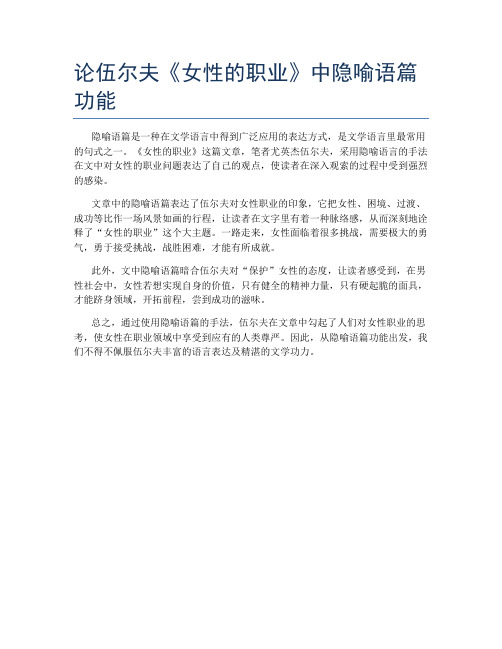
论伍尔夫《女性的职业》中隐喻语篇功能
隐喻语篇是一种在文学语言中得到广泛应用的表达方式,是文学语言里最常用的句式之一。
《女性的职业》这篇文章,笔者尤英杰伍尔夫,采用隐喻语言的手法在文中对女性的职业问题表达了自己的观点,使读者在深入观索的过程中受到强烈的感染。
文章中的隐喻语篇表达了伍尔夫对女性职业的印象,它把女性、困境、过渡、成功等比作一场风景如画的行程,让读者在文字里有着一种脉络感,从而深刻地诠释了“女性的职业”这个大主题。
一路走来,女性面临着很多挑战,需要极大的勇气,勇于接受挑战,战胜困难,才能有所成就。
此外,文中隐喻语篇暗合伍尔夫对“保护”女性的态度,让读者感受到,在男性社会中,女性若想实现自身的价值,只有健全的精神力量,只有硬起脆的面具,才能跻身领域,开拓前程,尝到成功的滋味。
总之,通过使用隐喻语篇的手法,伍尔夫在文章中勾起了人们对女性职业的思考,使女性在职业领域中享受到应有的人类尊严。
因此,从隐喻语篇功能出发,我们不得不佩服伍尔夫丰富的语言表达及精湛的文学功力。
女人的职业译文

Professions for Womenby Virginia Woolf (1882-1941)Born in England, Virginia Woolf was the daughter of Leslie Stephen, a well-known scholar. She was educated primarily at home and attributed her love of reading to the early and complete access she was g iven to her father’s library. With her husband, Leonard Woolf, she founded the Hogarth Press and became known as member of the Bloomsbury group of intellectuals, which included economist John Maynard Keynes, biographer Lytton Strachey, novelist E. M. Forster, and art historian Clive Bell. Although she was a central figure in London literary life, Woolf often saw herself as isolated from the mains stream because she was a woman. Woolf is best known for her experimental, modernist novels, including Mrs. Dalloway(1925) and To the Lighthouse(1927) which are widely appreciated for her breakthrough into a new mode and technique--the stream of consciousness. In her diary and critical essays she has much to say about women and fiction. Her 1929 book A Room of One’s Own documents her desire for women to take their rightful place in literary history and as an essayist she has occupied a high place in 20th century literature. The common Reader (1925 first series; 1932 second series) has acquired classic status. She also wrote short stories and biographies. “Professions for Women”taken from The collected Essays Vol 2. is originally a paper Woolf read to the Women’s Service League, an organization for professional women in London.Questions for Comprehension and Consideration1. Woolf’s essay is titled “Professions for Women.” Which profession does she discuss in detail? What reasons does Woolf give for finding writing a comfortable profession for a woman to pursue? What do these reasons suggest about the relationship between women, their families, and the world of work? Woolf says, “Pianos and models, Paris, Vienna, and Berlin, masters and mistresses, are not needed by a writer.” What does she mean by saying that? What actually does the author want to emphasize in the first paragraph? Do you detect some bitterness in tone in the first paragraph? If you do, can you point out where it lies? What is left unsaid here?2. What point does the writer make through the sardonic mention of her Persian cat in paragraph 2?3. What metaphors are used in paragraph 3? Who is the Angel in the House? What is her main qualities? Why did the Angel become symbolic of the emotional trmoil Woolf experienced when trying to work ( writing reviews of men’s writing for instance)? Who or what does the Angel represent? Why does the author take great pains to describe the Angel and the killing of the Angel? What does the author want to tell her audience in this paragrph? Write a dialogue between Woolf and the Angel. Develop the connflict that leads up to the murder of the Angel and reveals what Woolf learns during the struggle.4. In paragraph 4, Woolf asks, “What is a woman?” Explain her response to this question and then work on your own definition. Try also to answer the question “What is a man?” How is your definition different from your definition of a woman? How do you explain the discrepancies?5. What problem did Woolf encounter when she moved from writing reviews to writing novels? How does she use the analogy of the “fisherman lying sunk in dreams” to explain the problem she was facing? Who does the fisherman represent? The line racing through the girl’s fingers? The smash? What is the “something hard” that the imagination smashes against?5. What conclusion does the author come to in paragraph 6?6. Note the relationship between paragraph 6 and paragraph7. The author might well have stopped at paragraph 6 or after the fourth sentence of paragraph 7, but she goes on and introduces something new. What is it? How is the theme broadened and deepened at the end of the essay with the series of questions the author raises on the rooms women occupy (or will occupy) “in the house hitherto exclusively owned by men.” Woolf wrote “Professions for Women” in 1931;how would you answer her questions today, from the perspective of the 1990s?7. How does the essay impress you as a whole? How does the last paragraph impress you? Give your reasons.女人的职业听说你们协会是有关妇女就业的。
- 1、下载文档前请自行甄别文档内容的完整性,平台不提供额外的编辑、内容补充、找答案等附加服务。
- 2、"仅部分预览"的文档,不可在线预览部分如存在完整性等问题,可反馈申请退款(可完整预览的文档不适用该条件!)。
- 3、如文档侵犯您的权益,请联系客服反馈,我们会尽快为您处理(人工客服工作时间:9:00-18:30)。
弗吉尼亚.伍尔夫《职业女性》文体浅析摘要弗吉尼亚·伍尔夫在题为《职业女性》的演讲中历数了自己在写作生涯中所经历的种种挫折,以抨击维多利亚时代的社会现实,同时激励现代女性广泛地投身到社会生活中去,以实现自身的价值。
这篇演讲的文学价值在很大程度上得益于其文体的独到之处,作者在演讲中使用了象征手法和类比、隐喻等修辞方法,它们的成功运用对演讲主题的表达起到了至关重要的作用。
关键词:象征手法类比隐喻中图分类号:i106 文献标识码:a《职业女性》是英国20世纪著名女性主义小说家弗吉尼亚·伍尔夫在1931年应美国一个非官方组织the women’s service league 之邀所作的演讲。
伍尔夫在演讲中现身说法,从介绍自己从事写作生涯的种种经历入手,向听众和读者展示了自己在不同阶段的文学创作的心路历程,旨在抨击维多利亚时代的根深蒂固的夫权思想和这种思想对妇女在思想上的巨大束缚,揭露当时妇女没有经济和社会地位的现实,以此无情地鞭挞了男性社会的虚伪、迂腐和对女性的不公正待遇。
在演讲的结尾部分,作者分析了当今妇女所面对的社会现实,激励女性同胞们凭借自己的努力摆脱社会的束缚,从勇敢地去尝试各种不同的职业入手,以实现自身的价值,巩固在社会中争取到的一席之地。
这篇演讲在风格上一改作者在其他作品中所展示的意识流的写作特色,没有大量的人物的内心独白,在叙述上可谓平铺直叙,文字上也没有过多的修饰,因此读来轻松惬意。
但演讲却在平实的语言和简洁的文风中充分地展示了作者驾驭多种文体的才能,她将象征手法以及各类修辞手法,巧妙地融入到了自己经历的讲述当中去,显得自然清新,并且没有留下雕琢的痕迹。
因此,毫不夸张的说,这篇题为《职业女性》的演讲,从文体学的角度为读者提供了一个绝好的解读和欣赏弗吉尼亚·伍尔夫的写作风格和技巧的机会。
一象征手法的运用象征手法是根据事物之间的某种联系,借助某人某物的具体形象(象征体),以表现某种抽象的概念、思想和情感。
它可以使文章立意高远,含蓄深刻。
恰当地运用象征手法,可使某些比较抽象的精神品质,化为具体的可以感知的形象,从而给读者留下深刻的印象,赋予文章以深意,从而给读者留下咀嚼回味的余地。
弗吉尼亚·伍尔夫在演讲中提到自己是作为一个文学评论者的身份涉足写作行业的,表面上看,这是一个轻松惬意的职业,尤其是对一个维多利亚时代的女性来说似乎没什么比写作更适合的职业了。
作者以无奈和讥讽的口吻解释了其中的原因:写作成本低廉,那个时代的女性在家庭中是没有独立的经济地位的,因此不给家庭的财政造成负担是大多数女性选择写作的原因。
同时写作又不影响她们履行一个家庭主妇的职责,还可赚取一定生活费用。
如此看来,写作堪称是一个有百利而无一弊的完美的职业了。
但实际上,妇女在从事写作时却往往遇到一个难以逾越的障碍,就如弗吉尼亚本人所说,她在评论文学作品的过程中就遇到了一个被她称之为“the angel in the house”的阻止她正常工作的障碍。
作者说到在维多利亚时代每个家庭都有这样一个“angel”,也就是说,当时的妇女必须做到像天使(angel)一般的完美,即永远保持纯洁,对他人要充满同情,为人要无私等等。
在维多利亚时代的每个女性都被要求具备这样的特质,这也是那时的女性能在男性社会中生存的必备条件,所以这个“the angel in the house”就成了维多利亚时代典型的女性形象代表了。
在弗吉尼亚·伍尔夫评论一部文学作品时,“the angel in the house”就像一个驱之不去的鬼魂一样站在她的笔和纸之间,而当她每每要毫无保留地指出书中的缺点和问题时,“angel”都会“适时地”提醒她应该宽容,应该忽视那些缺点而去写一些溢美之词。
而且这个“angel”无时无地不在,并且每次都试图去控制作者手中的笔,让她无法工作下去,以致作者最终忍无可忍将其扼死。
很明显,在这段内容的讲述中,作者巧妙地使用了象征手法,用“the angel in the house”来象征维多利亚时代社会的传统观念,以及这种传统观念对于一个女性文学评论家的束缚,在这种传统观念的影响下,女性作家不能无所顾忌地真实地去评论一部作品,尤其是当这部作品是出自一位男性作者之手的时候,因为社会期待她们所做的就是去表扬、赞美、恭维,哪怕这种赞美是彻头彻尾的谎言。
所以每一个听众和读者在这时都对作者在此时发出的感慨感同身受:如果我听从“the angel in the house”的“忠告”并任其摆布的话,我的评论将丢失了灵魂,失去了应有的价值。
因此,作者做了一件勇敢并为之感到骄傲的事,即“killing the angel”,以此表达自己对于这种传统观念的深恶痛决和摆脱其束缚的坚定决心。
应该说,象征手法在这一部分的使用是非常成功的,它的使用使得一个抽象的概念,即维多利亚时代禁锢女性的传统观念以一个为每个人所熟知的天使(angel)的具体形象鲜活地呈现了出来,这样就让听众和读者能够更深刻地感受这种观念对女性的强烈束缚,以及人们要摆脱它的强烈渴望,使人更易产生共鸣,而且寓意也更为深远。
二修辞手法的运用修辞手法,就是通过修饰、调整语句,运用特定的表达形式以提高语言表达作用的方式或方法。
它能使所要表达的内容更加形象、生动、具体,增强文字的感染力,从而激发读者的情感,产生共鸣。
在修辞手法方面,本篇演讲使用频率最高的就是类比和隐喻了。
1 类比(analogy)的运用所谓类比,即把两类事物或物体在不同方面进行比较,它是一种扩展了的比喻。
类比的作用是借助类似的事物的特征刻画突出本体事物特征,更浅显形象地加深本体事物的理解,或加强作者的某种感情,烘托气氛,引起读者的联想。
作者在讲述自己写作小说的经历时,巧妙地运用到了类比修辞。
弗吉尼亚·伍尔夫是20世纪欧美文坛上著名的意识流小说家。
意识流小说是20世纪初兴起于西方、在现代哲学特别是现代心理学的基础上产生的小说类作品。
意识流的概念最早由美国心理学家威廉·詹姆斯提出。
他认为人的意识活动不是以各部分互不相关的零散方法进行的,而是一种流,是以思想流、主观生活之流、意识流的方法进行的。
同时又认为人的意识是由理性的自觉的意识和无逻辑、非理性的潜意识所构成;而人的过去的意识会浮现出来与现在的意识交织在一起,这就会重新组织人的时间感,形成一种在主观感觉中具有直接现实性的时间感。
这一理论观点促进了文学艺术中意识流方法的形成和发展。
意识流小说注重表现人物意识活动本身,作家着力描写人物心理的种种感受,开掘深层的意识来展露隐蔽的灵魂和内心世界。
基于此,作为一名意识流小说的代表人物,当弗吉尼亚·伍尔夫对听众坦诚地说出一个小说家在创作时最大的愿望就是保持一种遐想或者半梦半醒的状态时,大家就会心领神会了。
以这种直白的表达作者想告诉大家一个事实,那就是:对于一个小说家来说,解读潜意识中的内容是至关重要的,如果外界环境允许她无拘无束地徜徉在自己的意识深处,即潜意识的层面里,她就能通过不断地探索找到那里深藏的奥秘,这样作家就能给读者呈现表达最真实情感的作品了。
然而,这种愿望对于维多利亚时代的女性小说家却成了一种奢望,因为她们根本无法自由自在地在自己的意识深处遨游。
换言之,女性作家是无法将自己内心深处的感受没有保留地呈现给读者的。
为形象地诠释这种横亘在女性小说家面前的难以逾越的鸿沟,作者形象地借助了类比的修辞手法。
在这里,作者将渔夫和作家进行了类比。
首先,渔夫的鱼竿被比作了作家的思维,鱼竿在水中自由地漂浮以寻找最大的鱼儿,作家则任由自己的思维在潜意识中穿梭以搜寻内心深处的渴望,但是鱼竿在行进的过程中突然碰上了一块坚硬的石头,它使得前行中的鱼竿激起了浪花;同样的,作家自由遨游的思维也突然遭遇了一个巨大的障碍,这使得她猛地从半梦半醒的状态中惊醒。
很显然,作者在不同的方面将渔夫和作家进行了类比,读来形象生动。
那个横亘在女性小说家面前让她无法前进的巨大的障碍其实就是作家在自己潜意识中所读到的一个女性的真实的欲望,它包括女性在内心深处所拥有的激情和对完美的性的向往。
运用类比,作者形象地说明了这种关于身体的真实的表述是不被社会所接受的,就如同渔夫所经历的“一石激起千层浪”,它也只能给作者带来社会的口诛笔伐。
运用类比的修辞手法,作者真实地反映出维多利亚时代男权社会对女性思想的禁锢和压制以及其迂腐、虚伪的本质,因为同时作者又指出,虽然妇女被禁止谈论有关性的话题,但性对于女性作家来说无疑是一个危险的雷区,而男子包括男性作家却能完全游离于这种习俗之外、不受丝毫约束。
2 隐喻(metaphor)的运用隐喻修辞是比喻修辞的一种,它与明喻(simile)的区别在于:隐喻是在两类事物之间进行含蓄的比较,没有喻词连接本体和喻体,有时甚至本体和喻词都不出现,直接用喻体代替本体。
隐喻的使用可以使得原本生硬的表达变得栩栩如生,充满活力。
隐喻的修辞手法主要运用在了本篇演讲的最后一部分,这时作者讲述完了自己写作生涯中的种种已经克服和等待克服的障碍,继而对礼堂里来自社会各行各业的妇女同胞表达了真诚的钦佩之情,她说到:“you have won rooms of your own in the house hitherto exclusively owned by men.”这里的“room”和“house”均是隐喻用法。
很明显,“house”在此语境下指代整个社会,而“room”相应地便成了一个人所取得的社会地位和获得的自由空间的代名词了。
作者还巧妙地将这一隐喻扩展开来:“…the room is your own,but it is still bare.it has to be furnished;it has to be decorated;it has to be shared.”这个隐喻的运用完全是基于人们关于房子的常识做出的,因为没有人愿意让自己的房间总是空空荡荡、冷冷清清的,房子的主人必须通过装饰装修、家具的布置,甚至寻找同伴而努力使自己的房间适宜居住和充满生机。
通过这种进一步的比喻,作者语重心长地勉励现代社会中的职业女性不能满足于当前在社会中所取得的点滴成就,因为对于她们来说,前进的道路还很漫长,摆在她们面前需要思考和解决的问题还有很多很多。
三结语在一篇数千字的演讲中,弗吉尼亚·伍尔夫巧妙、熟练地运用了象征手法以及类比、隐喻等不同的修辞手法,形象生动地再现了自己在从事写作生涯几十年中所遭遇的种种障碍以及她为此所进行的勇敢抗争,以此揭露了维多利亚时代妇女卑微的社会和经济地位的现实、男权制度虚伪的本质,同时也表达了自己摆脱传统观念的禁锢的决心。
